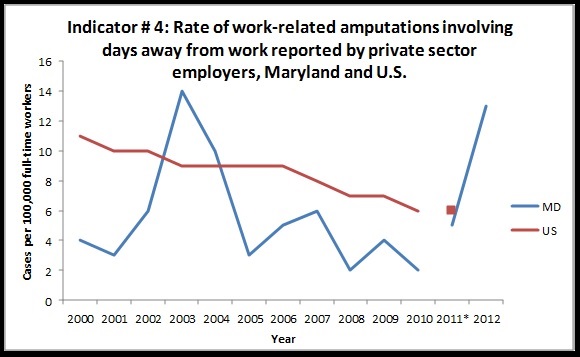Indicator #4: Amputations Reported by Employers

An amputation is defined as full or partial loss of a protruding body part – an arm, hand, finger, leg, foot, toe, ear, or nose. An amputation may greatly reduce a worker’s job skills and earning potential as well as significantly affect general quality of life.
The Bureau of Labor Statistics’ (BLS) Annual Survey of Occupational Injuries and Illnesses provides yearly state and national estimates of the numbers and incidence rates of work-related amputations that involve at least one day away from work.
Graph

Table
Indicator #4: With Days Away from Work Reported by Employers, Maryland
| Year | Number | Rate* |
|---|
| * Incidence Rate per 100,000 full-time workers |
| 2000 | 73 | 4.00 |
| 2001 | 58 | 3 |
| 2002 | 97 | 6 |
| 2003 | 230 | 14 |
| 2004 | 170 | 10 |
| 2005 | 60 | 3 |
| 2006 | 100 | 5 |
| 2007 | 110 | 6
|
| 2008 | 30 | 2 |
| 2009 | 70 | 4 |
| 2010 | 30 | 2 |
2011
2012 | 90
210 | 5
13 |
| 2013 | 80 | 5 |
| 2014 | 80 | 4 |
| 2015 | 60 | 3 |
| 2016 | 70 | 4 |
| 2017 | 80 | 5 |
| 2018 | 90 | 5 |
| 2019 | 80 | 4 |
| 2020 | 150 | 9 |
More about this Indicator
Why is this indicator important?
Work-related amputations are a preventable serious injury, and control of occupational hazards is the most effective means of prevention. Estimating the burden and tracking these injuries can help target prevention programs and activities. Information on reported cases can be used to identify contributory factors and to develop improved or new prevention strategies or regulations to protect workers.
Data Source for this Indicator:
Bureau of Labor Statistics’ Annual Survey of Occupational Injuries and Illnesses. For More information on this data source
http://www.bls.gov/iif/.
U.S. data and information about this indicator obtained from http://www.cste.org/general/custom.asp?page=OHIndicators
Limitation of Indicator
The Survey of Occupational Injuries and Illnesses is conducted by the Bureau of Labor Statistics using a probability sample and not a census of all employers. It is based on injury and illness data maintained by employers and is subject to sampling error. There is a potential for additional sampling error if an employer has more than 30 cases with days away from work as an employer is only required to report on 30 such cases. Military, self-employed individuals, farms with fewer than 11 employees, and Federal agencies are excluded from the survey.

